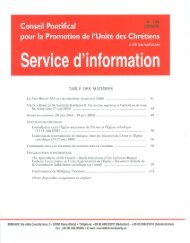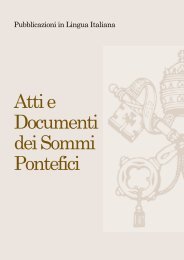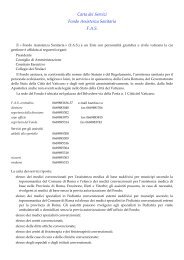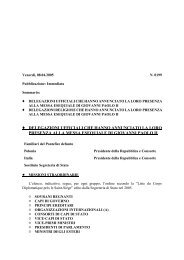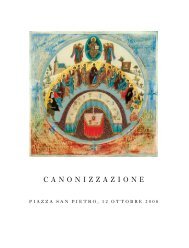- Page 1:
ACTA APOSTOLICAE SEDIS COMMENTARIUM
- Page 6 and 7:
6 Acta Apostolicae Sedis - Commenta
- Page 8 and 9:
8 Acta Apostolicae Sedis - Commenta
- Page 10 and 11:
10 Acta Apostolicae Sedis - Comment
- Page 12 and 13:
12 Acta Apostolicae Sedis - Comment
- Page 14 and 15:
14 Acta Apostolicae Sedis - Comment
- Page 16 and 17:
16 Acta Apostolicae Sedis - Comment
- Page 18 and 19:
18 Acta Apostolicae Sedis - Comment
- Page 20 and 21:
20 Acta Apostolicae Sedis - Comment
- Page 22 and 23:
22 Acta Apostolicae Sedis - Comment
- Page 24 and 25:
24 Acta Apostolicae Sedis - Comment
- Page 26 and 27:
26 Acta Apostolicae Sedis - Comment
- Page 28 and 29:
28 Acta Apostolicae Sedis - Comment
- Page 30 and 31:
30 Acta Apostolicae Sedis - Comment
- Page 32 and 33:
32 Acta Apostolicae Sedis - Comment
- Page 34 and 35:
34 Acta Apostolicae Sedis - Comment
- Page 36 and 37:
36 Acta Apostolicae Sedis - Comment
- Page 38 and 39:
38 Acta Apostolicae Sedis - Comment
- Page 40 and 41:
40 Acta Apostolicae Sedis - Comment
- Page 42 and 43:
42 Acta Apostolicae Sedis --- Comme
- Page 44 and 45:
44 Acta Apostolicae Sedis - Comment
- Page 46 and 47:
46. Acta Apostolicae Sedis - Commen
- Page 48 and 49:
48 Acta Apostolicae Sedis - Comment
- Page 50 and 51:
50 Acta Apostolicae Sedis - Comment
- Page 52 and 53:
52 Acta Apostolicae Sedis - Comment
- Page 54 and 55:
54 Acta Apostolicae Sedis - Comment
- Page 56 and 57:
56 Acta Apostolicae Sedis - Comment
- Page 58 and 59:
58 Acta Apostolicae Sedis - Comment
- Page 60 and 61:
60 Acta Apostolicae Sedis - Comment
- Page 62 and 63:
62 Acta Apostolicae Sedis - Comment
- Page 64 and 65:
64 Acta Apostolicae Sedis - Comment
- Page 66 and 67:
66 Acta Apostolicae Sedis - Comment
- Page 68 and 69:
68 Acta Apostolicae Sedis - Comment
- Page 70 and 71:
70 Acta Apostolicae Sedis - Comment
- Page 72 and 73:
72 Acta Apostolicae Sedis - Comment
- Page 74 and 75:
74 Acta Apostolicae Sedis - Comment
- Page 76 and 77:
76 acta Apostolicae Sedis - Comment
- Page 78 and 79:
78 Acta Apostolicae Sedis - Comment
- Page 80 and 81:
80 Acta Apostolicae Sedis -r Commen
- Page 82 and 83:
82 Acta Apostolicae Sedis - Comment
- Page 84 and 85:
84 Acta Apostolicae Sedis - Comment
- Page 86 and 87:
86 Acta Apostolicae Sedis - Comment
- Page 88 and 89:
88 Acta Apostolicae Sedis - Comment
- Page 90 and 91:
90 Acta Apostolicae Sedis - Comment
- Page 92 and 93:
92 Acta Apostolicae Sedis - Comment
- Page 94 and 95:
94 Acta Apostolicae Sedis - Comment
- Page 96 and 97:
96 Acta Apostolicae Sedis - Comment
- Page 98 and 99:
98 Acta Apostolicae Sedis - Comment
- Page 100 and 101:
100 Acta Apostolicae Sedis - Commen
- Page 102 and 103:
102 Acta Apostolicae Sedis - Commen
- Page 104 and 105:
104 Acta Apostolicae Sedis - Commen
- Page 106 and 107:
106 Acta Apostolicae Sedis - Commen
- Page 108 and 109:
108 Acta Apostolicae Sedis - Commen
- Page 110 and 111:
110 Acta Apostolicae Sedis - Commen
- Page 112 and 113:
112 Acta Apostolicae Sedis - Commen
- Page 114 and 115:
114 Acta Apostolicae Sedis - Commen
- Page 116 and 117:
116 Acta Apostolicae Sedis - Commen
- Page 118 and 119:
118 Acta Apostolicae Sedis - Commen
- Page 120 and 121:
120 Acta Apostolicae Sedis - Commen
- Page 122 and 123:
122 Acta Apostolicae Sedis - Commen
- Page 124 and 125:
124 Acta Apostolicae Sedis - Commen
- Page 126 and 127:
126 Acta Apostolicae Sedis - Commen
- Page 128 and 129:
128 Acta Apostolicae Sedis - Commen
- Page 130 and 131:
130 Acta Apostolicae Sedis - Commen
- Page 132 and 133:
132 Acta Apostolicae Sedis - Commen
- Page 134 and 135:
134 Acta Apostolicae Sedis - Commen
- Page 136 and 137:
136 Acta Apostolicae Sedis - Commen
- Page 138 and 139:
138 Acta Apostolicae Sedis - Commen
- Page 140 and 141:
140 Acta Apostolicae Sedis - Commen
- Page 142 and 143:
142 Acta Apostolicae Sedis - Commen
- Page 144 and 145:
144 Acta Apostolicae Sedis - Commen
- Page 146 and 147:
146 Acta Apostolicae Sedis - Commen
- Page 148 and 149:
148 Acta Apostolicae Sedis - Commen
- Page 150 and 151:
150 Acta Apostolicae Sedis - Commen
- Page 152 and 153:
152 Acta Apostolicae Sedis - Commen
- Page 154 and 155:
154 Acta Apostolicae Sedis - Commen
- Page 156 and 157:
156 Acta Apostolicae Sedis - Commen
- Page 158 and 159:
158 Acta Apostolicae Sedis - Commen
- Page 160 and 161:
160 Acta Apostolicae Sedis - Commen
- Page 162 and 163:
162 Acta Apostolicae Sedis - Commen
- Page 164 and 165:
164 Acta Apostolicae Sedis - Commen
- Page 166 and 167:
166 Acta Apostolicae Sedis - Commen
- Page 168 and 169:
168 Acta Apostolicae Sedis - Commen
- Page 170 and 171:
170 Acta Apostolicae Sedis - Commen
- Page 172 and 173:
172 Acta Apostolicae Sedis - Commen
- Page 174 and 175:
174 Acta Apostolicae Sedis - Commen
- Page 176 and 177:
176 Acta Apostolicae Sedis - Commen
- Page 178 and 179:
178 Acta Apostolicae Sedis - Commen
- Page 180 and 181:
180 Acta Apostolicae Sedis - Commen
- Page 182 and 183:
182 Acta Apostolicae Sedis - Commen
- Page 184 and 185:
184 Acta Apostolicae Sedis - Commen
- Page 186 and 187:
186 Acta Apostolicae Sedis - Commen
- Page 188 and 189:
188 Acta Apostolicae Sedis - Commen
- Page 190 and 191:
190 Acta Apostolicae Sedis - Commen
- Page 192 and 193:
192 Acta Apostolicae Sedis - Commen
- Page 194 and 195:
194 Acta Apostolicae Sedis - Commen
- Page 196 and 197:
196 Acta Apostolicae Sedis - Commen
- Page 198 and 199:
198 Acta Apostolicae Sedis - Commen
- Page 200 and 201:
200 Acta Apostolicae Sedis - Commen
- Page 202 and 203:
202 Acta Apostolicae Sedis - Commen
- Page 204 and 205:
204 Acta Apostolicae Sedis - Commen
- Page 206 and 207:
206 Acta Apostolicae Sedis - Commen
- Page 208 and 209:
208 Acta Apostolicae Sedis - Commen
- Page 210 and 211:
210 Acta Apostolicae Sedis - Commen
- Page 212 and 213:
212 Acta Apostolicae Sedis - Commen
- Page 214 and 215:
214 Acta Apostolicae Sedis - Commen
- Page 216 and 217:
216 Acta Apostolicae Sedis - Commen
- Page 218 and 219:
218 Acta Apostolicae Sedis - Commen
- Page 220 and 221:
220 Acta Apostolicae Sedis - Commen
- Page 222 and 223:
222 Acta Apostolicae Sedis - Commen
- Page 224 and 225:
224 Acta Apostolicae Sedis - Commen
- Page 226 and 227:
226 Acta Apostolicae Sedis - Commen
- Page 228 and 229:
228 Acta Apostolicae Sedis - Commen
- Page 230 and 231:
230 Acta Apostolicae Sedis - Commen
- Page 232 and 233:
232 Acta Apostolicae Sedis - Commen
- Page 234 and 235:
234 Acta Apostolicae Sedis - Commen
- Page 236 and 237:
236 Acta Apostolicae Sedis - Commen
- Page 238 and 239:
238 Acta Apostolicae Sedis - Commen
- Page 240 and 241:
240 Acta Apostolicae Sectis - Comme
- Page 242 and 243:
242 Acta Apostolicae Sedis - Commen
- Page 244 and 245:
244 Acta Apostolicae Sedis - Commen
- Page 246 and 247:
246 Acta Apostolicae Sedis - Commen
- Page 248 and 249:
248 Acta Apostolicae Sedis - Commen
- Page 250 and 251:
250 Acta Apostolicae Sedis - Commen
- Page 252 and 253:
252, Acta Apostolicae Sedis - Comme
- Page 254 and 255:
254 Acta Apostolicae Sedis - Commen
- Page 256 and 257:
256 Acta Apostolicae Sedis — Comm
- Page 258 and 259:
258 Acta Apostolicae Sedis - Commen
- Page 260 and 261:
260 Acta Apostolicae Sedis - Commen
- Page 262 and 263:
262 Acta Apostolicae Sedis - Commen
- Page 264 and 265:
264 Acta Apostolicae Sedis - Commen
- Page 266 and 267:
266 Acta Apostolicae Sedis - Commen
- Page 268 and 269:
268 Acta Apostolicae Sedis - Commen
- Page 270 and 271:
270 Acta Apostolicae Sedis - Commen
- Page 272 and 273:
272 Acta Apostolicae Sedis =- Comme
- Page 274 and 275:
274 Acta Apostolicae Sedis - Commen
- Page 276 and 277:
276 Acta Apostolicae Sedis *• Com
- Page 278 and 279:
278 Acta Apostolicae Sedis - Commen
- Page 280 and 281:
280 Acta Apostolicae Sedis - Commen
- Page 282 and 283:
282 Acta Apostolicae Sedis - Commen
- Page 284 and 285:
284 Acta Apostolicae Sedis - Commen
- Page 286 and 287: 286 Acta Apostolicae Sedis - Commen
- Page 288 and 289: 288 Acta Apostolicae Sedis - Commen
- Page 290 and 291: 290 Acta Apostolicae Sedis - Commen
- Page 292 and 293: 292 Acta Apostolicae Sedis - Commen
- Page 294 and 295: 294 Acta Apostolicae Sedis - Commen
- Page 296 and 297: 296 Acta Apostolicae Sedis - Commen
- Page 298 and 299: 298 Acta Apostolicae Sedis - Commen
- Page 300 and 301: 300 Acta Apostolicae Sedis - Commen
- Page 302 and 303: 302 Acta Apostolicae Sedis - Commen
- Page 304 and 305: 304 Acta Apostolicae Sedis - Commen
- Page 306 and 307: 306 Acta Apostolicae Sedis - Commen
- Page 308 and 309: 308 Acta Apostolicae Sedis - Commen
- Page 310 and 311: 310 Acta Apostolicae Sedis - Commen
- Page 312 and 313: 312 Acta Apostolicae Sedis - Commen
- Page 314 and 315: 314 Acta Apostolicae Sedis - Commen
- Page 316 and 317: 316 Acta Apostolicae Sedis - Commen
- Page 318 and 319: 318 Acta Apostolicae Sedis - Commen
- Page 320 and 321: 320 Acta Apostolicae Sedis - Commen
- Page 322 and 323: 322 Acta Apostolicae Sedis - Commen
- Page 324 and 325: 324 Acta Apostolicae Sedis - Commen
- Page 326 and 327: 326 Acta Apostolicae Sedis - Commen
- Page 328 and 329: 328 Acta Apostolicae Sedis - Commen
- Page 330 and 331: 330 Acta Apostolicae Sedis - Commen
- Page 332 and 333: 332 Acta Apostolicae Sedis - Commen
- Page 334 and 335: 334 Acta Apostolicae Sedis - Commen
- Page 338 and 339: 338 Acta Apostolicae Sedis - Commen
- Page 340 and 341: 340 Acta Apostolicae Sedis - Commen
- Page 342 and 343: 342 Acta Apostolicae Sedis - Commen
- Page 344 and 345: 344 Acta Apostolicae Sedis - Commen
- Page 346 and 347: 346 Acta Apostolicae Sedis - Commen
- Page 348 and 349: 348 Acta Apostolicae Sedis - Commen
- Page 350 and 351: 350 Acta Apostolicae Sedis - Commen
- Page 352 and 353: 352 Acta Apostolicae Sedis - Commen
- Page 354 and 355: 354 Acta Apostolicae Sedis - Commen
- Page 356 and 357: 356 Acta Apostolicae Sedis - Commen
- Page 358 and 359: 358 Acta Apostolicae Sedis - Commen
- Page 360 and 361: 360 Acta Apostolicae Sedis - Commen
- Page 362 and 363: 362 Acta Apostolicae Sedis - Commen
- Page 364 and 365: 364 Acta, Apostolicae Sedis - Comme
- Page 366 and 367: 366 Acta Apostolicae Sedis - Commen
- Page 368 and 369: 368 Acta Apostolicae Sedis - Commen
- Page 370 and 371: 370 Acta Apostolicae Sedis - Commen
- Page 372 and 373: 372 Acta Apostolicae Sedis - Commen
- Page 374 and 375: 374 Acta Apostolicae Sedis - Commen
- Page 376 and 377: 376 Acta Apostolicae Sedis - Commen
- Page 378 and 379: 378 Acta Apostolicae Sedis — Comm
- Page 380 and 381: 380 Acta Apostolicae Sedis - Commen
- Page 382 and 383: 382 Acta Apostolicae Sedis - Commen
- Page 384 and 385: 384 13 15 marzo » 8 aprile » »
- Page 386 and 387:
386 Acta Apostolicae Sedis - Commen
- Page 388 and 389:
388 Acta Apostolicae Sedis - Commen
- Page 390 and 391:
390 Acta Apostolicae Sedis - Commen
- Page 392 and 393:
392 Acta Apostolicae Sedis - Commen
- Page 394 and 395:
394 Acta Apostolicae Sedis - Commen
- Page 396 and 397:
396 Acta Apostolicae Sedis - Commen
- Page 398 and 399:
398 Acta Apostolicae Sedis - Commen
- Page 400 and 401:
400 Acta Apostolicae Sedis - Commen
- Page 402 and 403:
402 Acta Apostolicae Sedis - Commen
- Page 404 and 405:
404 Acta Apostolicae Sedis - Commen
- Page 406 and 407:
406 Acta Apostolicae Sedis - Commen
- Page 408 and 409:
408 Acta Apostolicae Sedis — Comm
- Page 410 and 411:
410 Acta Apostolicae Sedis - Commen
- Page 412 and 413:
412 Acta Apostolicae Sedis - Commen
- Page 414 and 415:
414 Acta Apostolicae Sedis - Commen
- Page 416 and 417:
416 Acta Apostolicae Sedis - Commen
- Page 418 and 419:
418 Acta Apostolicae Sedis - Commen
- Page 420 and 421:
420 fìce. 2 Acta Apostolicae Sedis
- Page 422 and 423:
422 Acta Apostolicae Sedis - Commen
- Page 424 and 425:
424 Acta Apostolicae Sedis - Commen
- Page 426 and 427:
426 Acta Apostolicae Sedis - Commen
- Page 428 and 429:
428 Acta Apostolicae Sedis - Commen
- Page 430 and 431:
430 Acta Apostolicae Sedis - Commen
- Page 432 and 433:
432 Acta Apostolicae Sedis - Commen
- Page 434 and 435:
434 Acta Apostolicae Sedis - Commen
- Page 436 and 437:
436 Acta Apostolicae Sedis - Commen
- Page 438 and 439:
438 Acta Apostolicae Sedis - Commen
- Page 440 and 441:
440 Acta Apostolicae Sedis - Commen
- Page 442 and 443:
442 Acta Apostolicae Sedis - Commen
- Page 444 and 445:
444 Acta Apostolicae Sedis - Commen
- Page 446 and 447:
446 Acta Apostolicae Sedis - Commen
- Page 448 and 449:
448 Acta Apostolicae Sedis - Commen
- Page 450 and 451:
450 Acta Apostolicae Sedis - Commen
- Page 452 and 453:
452 Acta Apostolicae Sedis - Commen
- Page 454 and 455:
454 Acta Apostolicae Sedis - Commen
- Page 456 and 457:
456 Acta Apostolicae Sedis - Commen
- Page 458 and 459:
458 Acta Apostolicae Sedis - Commen
- Page 460 and 461:
460 Acta Apostolicae Sedis - Commen
- Page 462 and 463:
462 Acta Apostolicae Sedis - Commen
- Page 464 and 465:
464 Acta Apostolicae Sedis - Commen
- Page 466 and 467:
466 Acta Apostolicae Sedis - Commen
- Page 468 and 469:
468 Acta Apostolicae Sedis - Commen
- Page 470 and 471:
470 Acta Apostolicae Sedis - Commen
- Page 472 and 473:
472 Acta Apostolicae Sedis - Commen
- Page 474 and 475:
474 Acta Apostolicae Sedis - Commen
- Page 476 and 477:
476 Acta Apostolicae Sedis - Commen
- Page 478 and 479:
478 Acta Apostolicae Sedis - Commen
- Page 480 and 481:
480 Acta Apostolicae Sedis - Commen
- Page 482 and 483:
482 Acta Apostolicae Sedis - Commen
- Page 484 and 485:
484 Acta Apostolicae Sedis - Commen
- Page 486 and 487:
486 Acta Apostolicae Sedis - Commen
- Page 488 and 489:
488 Acta Apostolicae Sedis - Commen
- Page 490 and 491:
490 Acta Apostolicae Sedis - Commen
- Page 492 and 493:
492 Acta Apostolicae Sedis - Commen
- Page 494 and 495:
494 Acta Apostolicae Sedis - Commen
- Page 496 and 497:
496 Acta Apostolicae Sedis - Commen
- Page 498 and 499:
498 Acta Apostolicae Sedis - Commen
- Page 500 and 501:
500 Acta Apostolicae Sedis - Commen
- Page 502 and 503:
502 Acta Apostolicae Sedis - Commen
- Page 504 and 505:
504 Acta Apostolicae Sedis - Commen
- Page 506 and 507:
506 Acta Apostolicae Sedis - Commen
- Page 508 and 509:
508 Acta Apostolicae Sedis - Commen
- Page 510 and 511:
510 Acta Apostolicae Sedis - Commen
- Page 512 and 513:
512 Acta Apostolicae Sedis - Commen
- Page 514 and 515:
514 Acta Apostolicae Sedis - Commen
- Page 516 and 517:
516 Acta Apostolicae Sedis - Commen
- Page 518 and 519:
518 Acta Apostolicae Sedis - Commen
- Page 520 and 521:
520 Acta Apostolicae Sedis - Commen
- Page 522 and 523:
522 Acta Apostolicae Sedis - Commen
- Page 524 and 525:
524 Acta Apostolicae Sedis - Commen
- Page 526 and 527:
526 Acta Apostolicae Sedis Commenta
- Page 528 and 529:
528 Acta Apostolicae Sedis - Commen
- Page 530 and 531:
530 Acta Apostolicae Sedis - Commen
- Page 532 and 533:
532 Acta Apostolicae Sedis - Commen
- Page 534 and 535:
534 Acta Apostolicae Sedis - Commen
- Page 536 and 537:
536 Acta Apostolicae Sedis - Commen
- Page 538 and 539:
538 Acta Apostolicae Sedis - Commen
- Page 540 and 541:
540 Acta Apostolicae Sedis - Commen
- Page 542 and 543:
542 Acta Apostolicae Sedis - Commen
- Page 544 and 545:
544 Acta Apostolicae Sedis - Commen
- Page 546 and 547:
546 Acta Apostolicae Sedis - Commen
- Page 548 and 549:
548 Acta Apostolicae Sedis - Commen
- Page 550 and 551:
550 Acta Apostolicae Sedis - Commen
- Page 552 and 553:
552 Acta Apostolicae Sedis - Commen
- Page 554 and 555:
554 Acta Apostolicae Sedis - Commen
- Page 556 and 557:
556 Acta Apostolicae Sedis - Commen
- Page 558 and 559:
558 Acta Apostolicae Sedis - Commen
- Page 560 and 561:
560 Acta Apostolicae Sedis - Commen
- Page 562 and 563:
562 Acta Apostolicae Sedis - Commen
- Page 564 and 565:
564 Acta Apostolicae Sedis - Commen
- Page 566 and 567:
566 Acta Apostolicae Sedis - Commen
- Page 568 and 569:
568 Acta Apostolicae Sedis - Commen
- Page 570 and 571:
570 Acta Apostolicae Sedis - Commen
- Page 572 and 573:
572 Acta Apostolicae Sedis - Commen
- Page 574 and 575:
574 Acta Apostolicae Sedis - Commen
- Page 576 and 577:
576 Acta Apostolicae Sedis - Commen
- Page 578 and 579:
578 Acta Apostolicae Sedis - Commen
- Page 580 and 581:
580 Acta Apostolicae Sedis - Commen
- Page 582 and 583:
582 Acta Apostolicae Sedis - Commen
- Page 584 and 585:
584 Acta Apostolicae Sedis - Commen
- Page 586 and 587:
586 Acta Apostolicae Sedis - Commen
- Page 588 and 589:
588 Acta Apostolicae Sedis - Commen
- Page 590 and 591:
590 Acta Apostolicae Sedis - Commen
- Page 592 and 593:
592 Acta Apostolicae Sedis - Commen
- Page 594 and 595:
594 Acta Apostolicae Sedis - Commen
- Page 596 and 597:
596 Acta Apostolicae Sedis - Commen
- Page 598 and 599:
598 Acta Apostolicae Sedis - Commen
- Page 600 and 601:
600 Acta Apostolicae Sedis - Commen
- Page 602 and 603:
602 Acta Apostolicae Sedis - Commen
- Page 604 and 605:
604 Acta Apostolicae Sedis - Commen
- Page 606 and 607:
606 Acta Apostolicae Sedis - Commen
- Page 608 and 609:
608 Acta Apostolicae Sedis - Commen
- Page 610 and 611:
610 Acta Apostolicae Sedis - Commen
- Page 612 and 613:
612 Acta Apostolicae Sedis - Commen
- Page 614 and 615:
614 Acta Apostolicae Sedis - Commen
- Page 616 and 617:
616 Acta Apostolicae Sedis — Comm
- Page 618 and 619:
618 Acta Apostolicae Sedis — Comm
- Page 620 and 621:
620 Acta Apostolicae Sedis - Commen
- Page 622 and 623:
622 Acta Apostolicae Sedis - Commen
- Page 624 and 625:
624 Acta Apostolicae Sedis - Commen
- Page 626 and 627:
626 Acta Apostolicae Sedis - Commen
- Page 628 and 629:
628 Acta Apostolicae Sedis - Commen
- Page 630 and 631:
630 Acta Apostolicae Sedis - Commen
- Page 632 and 633:
632 Acta Apostolicae Sedis - Commen
- Page 634 and 635:
634 Acta Apostolicae Sedis - Commen
- Page 636 and 637:
636 Acta Apostolicae Sedis - Commen
- Page 638 and 639:
638 Acta Apostolicae Sedis - Commen
- Page 640 and 641:
640 Ex INSULIS CUKIENSIBUS : Acta A
- Page 642 and 643:
642 Acta Apostolicae Sedis - Commen
- Page 644 and 645:
644 E IUGOSLAVIA : Acta Apostolicae
- Page 646 and 647:
646 Acta Apostolicae Sedis - Commen
- Page 648 and 649:
648 Acta Apostolicae Sedis - Commen
- Page 650 and 651:
650 E MALA vio : Acta Apostolicae S
- Page 652 and 653:
652 Acta, Apostolicae Sedis - Comme
- Page 654 and 655:
654 E NIGRITANA REPUBLICA : Acta Ap
- Page 656 and 657:
656 Acta Apostolicae Sedis - Commen
- Page 658 and 659:
658 E ROMANIA : Acta Apostolicae Se
- Page 660 and 661:
660 Acta Apostolicae Sedis - Commen
- Page 662 and 663:
662 Acta Apostolicae Sedis - Commen
- Page 664 and 665:
664 Acta Apostolicae Sedis - Commen
- Page 666 and 667:
666 Acta Apostolicae Sedis - Commen
- Page 668 and 669:
668 Acta Apostolicae Sedis - Commen
- Page 670 and 671:
670 Acta Apostolicae Sedis - Commen
- Page 672 and 673:
672 Acta Apostolicae Sedis - Commen
- Page 674 and 675:
•••••••••••
- Page 676 and 677:
. Cum fere innúmera pietatis et ob
- Page 678 and 679:
678 Acta Apostolicae Sedis - Commen
- Page 680 and 681:
680 Acta Apostolicae Sedis - Commen
- Page 682 and 683:
682 Acta Apostolicae Sedis - Commen
- Page 684 and 685:
684 Acta Apostolicae Sedis - Commen
- Page 686 and 687:
686 Acta Apostolicae Sedis — Comm
- Page 688 and 689:
688 In nome di Dio. Così sia. Acta
- Page 690 and 691:
690 Acta Apostolicae Sectis - Comme
- Page 692 and 693:
692 Acta Apostolicae Sedis - Commen
- Page 694 and 695:
694 Acta Apostolicae Sedis - Commen
- Page 696 and 697:
696 Acta Apostolicae Sedis - Commen
- Page 698 and 699:
Acta Apostolicae Sedis - Commentari
- Page 700 and 701:
700 Acta Apostolicae Sedis - Commen
- Page 702 and 703:
702 Acta Apostolicae Sedis - Commen
- Page 704 and 705:
704 Acta Apostolicae Sedis - Commen
- Page 706 and 707:
706 Acta Apostolicae Sedis - Commen
- Page 708 and 709:
708 Acta Apostolicae Sedis - Commen
- Page 710 and 711:
710 Acta Apostolicae Sedis - Commen
- Page 712 and 713:
712 Acta Apostolicae Sedis - Commen
- Page 714 and 715:
714 Acta Apostolicae Sedis - Commen
- Page 716 and 717:
716 Acta Apostolicae Sedis Commenta
- Page 718 and 719:
718 Acta Apostolicae Sedis - Commen
- Page 720 and 721:
720 Acta Apostolicae Sedis - Commen
- Page 722 and 723:
722 Acta Apostolicae Sedis - Commen
- Page 724 and 725:
724 Acta Apostolicae Sedis - Commen
- Page 726 and 727:
726 Acta Apostolicae Sedis - Commen
- Page 728 and 729:
728 Acta Apostolicae Sedis - Commen
- Page 730 and 731:
730 Acta Apostolicae Sedis - Commen
- Page 732 and 733:
732 Acta Apostolicae Sedis - Commen
- Page 734 and 735:
1Z4 Acta Apostolicae Sedis - Commen
- Page 736 and 737:
736 Acta Apostolicae Sedis - Commen
- Page 738 and 739:
738 Acta Apostolicae Sedis - Commen
- Page 740 and 741:
740 Acta Apostolicae Sedis - Commen
- Page 742 and 743:
742 Acta Apostolicae Sedis - Commen
- Page 744 and 745:
744 Acta Apostolicae Sedis - Commen
- Page 746 and 747:
746 Acta Apostolicae Sedis - Commen
- Page 748 and 749:
748 Acta Apostolicae Sedis - Commen
- Page 750 and 751:
750 La terza lettura 12 Acta Aposto
- Page 752 and 753:
PONTIFICIUM INSIGNE IOANNIS PAULI I
- Page 754 and 755:
754 Acta Apostolicae Sedis — Comm
- Page 756 and 757:
756 Acta Apostolicae Sedis - Commen
- Page 758 and 759:
758 Acta Apostolicae Sedis - Commen
- Page 760 and 761:
760 Acta Apostolicae Sedis - Commen
- Page 762 and 763:
762 Acta Apostolicae Sedis - Commen
- Page 764 and 765:
764 Acta Apostolicae Sedis - Commen
- Page 766 and 767:
766 Acta Apostolicae Sedis - Commen
- Page 768 and 769:
768 Acta Apostolicae Sedis - Commen
- Page 770 and 771:
770 Acta Apostolicae Sedis - Commen
- Page 772 and 773:
772 Acta Apostolicae Sedis - Commen
- Page 774 and 775:
774 Acta Apostolicae Sedis - Commen
- Page 776 and 777:
776 Acta Apostolicae Sedis - Commen
- Page 778 and 779:
778 Acta Apostolicae Sedis - Commen
- Page 780 and 781:
780 Acta Apostolicae Sedis - Commen
- Page 782 and 783:
782 Acta Apostolicae Sedis - Commen
- Page 784 and 785:
784 Acta Apostolicae Sedis - Commen
- Page 786 and 787:
786 Acta Apostolicae Sedis - Commen
- Page 788 and 789:
788 Acta Apostolicae Sedis - Commen
- Page 790 and 791:
« 790 Acta Apostolicae Sedis - Com
- Page 792 and 793:
792 Acta Apostolicae Sedis - Commen
- Page 794 and 795:
794 Acta Apostolicae Sedis - Commen
- Page 796 and 797:
796 17 gennaio 1978. Mons. 6 agosto
- Page 798 and 799:
798 Acta Apostolicae Sedis - Commen
- Page 800 and 801:
800 Acta Apostolicae Sedis - Commen
- Page 802 and 803:
802 Acta Apostolicae Sedis - Commen
- Page 804 and 805:
804 Acta Apostolicae Sedis - Commen
- Page 806 and 807:
806 Acta Apostolicae Sedis - Commen
- Page 808 and 809:
808 Acta Apostolicae Sedis - Commen
- Page 810 and 811:
810 L.ffi-S. Acta Apostolicae Sedis
- Page 812 and 813:
812 Acta Apostolicae Sedis - Commen
- Page 814 and 815:
814 Acta Apostolicae Sedis - Commen
- Page 816 and 817:
816 Acta Apostolicae Sedis - Commen
- Page 818 and 819:
818 Acta Apostolicae Sedis - Commen
- Page 820 and 821:
820 Acta Apostolicae Sedis - Commen
- Page 822 and 823:
822 Acta Apostolicae Sedis - Commen
- Page 824 and 825:
824 Acta Apostolicae Sedis - Commen
- Page 826 and 827:
826 Acta Apostolicae Sedis - Commen
- Page 828 and 829:
828 Acta Apostolicae Sedis - Commen
- Page 830 and 831:
830 Acta Apostolicae Sedis - Commen
- Page 832 and 833:
832 Acta Apostolicae Sedis - Commen
- Page 834 and 835:
834 Acta Apostolicae Sedis - Commen
- Page 836 and 837:
836 Acta Apostolicae Sedis - Commen
- Page 838 and 839:
838 Acta Apostolicae Sedis - Commen
- Page 840 and 841:
840 Acta Apostolicae Sedis - Commen
- Page 842 and 843:
842 Acta Apostolicae Sedis - Commen
- Page 844 and 845:
844 Acta Apostolicae Sedis - Commen
- Page 846 and 847:
846 Acta Apostolicae Sedis - Commen
- Page 848 and 849:
848 Acta Apostolicae Sedis - Commen
- Page 850 and 851:
850 Acta Apostolicae Sedis - Commen
- Page 852 and 853:
852 Acta Apostolicae Sedis - Commen
- Page 854 and 855:
854 Acta Apostolicae Sedis - Commen
- Page 856 and 857:
856 Acta Apostolicae Sedis - Commen
- Page 858 and 859:
858 Acta Apostolicae Sedis - Commen
- Page 860 and 861:
860 Acta Apostolicae Sedis - Commen
- Page 862 and 863:
862 E BOTSVANA : Acta Apostolicae S
- Page 864 and 865:
964 Acta Apostolicae Sedis- Comment
- Page 866 and 867:
866 Acta Apostolicae Sedis - Commen
- Page 868 and 869:
868 Acta, Apostolicae Sedis - Comme
- Page 870 and 871:
870 Acta, Apostolicae Sedis - Comme
- Page 872 and 873:
872 Acta Apostolicae Sedis - Commen
- Page 874 and 875:
874 Acta Apostolicae Sedis - Commen
- Page 876 and 877:
876 Acta Apostolicae Sedis - Commen
- Page 878 and 879:
878 Ex INSULIS BABBATIANIS : Acta A
- Page 880 and 881:
880 IH^BSSBHHiBBHHHI^HHHIHBBHflHBfl
- Page 882 and 883:
882 Acta Apostolicae Sedis - Commen
- Page 884 and 885:
884 Acta Apostolicae Sedis - Commen
- Page 886 and 887:
886 Acta Apostolicae Sedis - Commen
- Page 888 and 889:
888 E NIGRITANA REPUBLICA : Acta Ap
- Page 890 and 891:
890 Acta Apostolicae Sedis - Cornme
- Page 892 and 893:
892 E SANCTI MARINI REPUBLICA : Act
- Page 894 and 895:
894 Acta Apostolicae Sedis - Commen
- Page 896 and 897:
896 E THAILANDIA : Acta Apostolicae
- Page 898 and 899:
898 Acta Apostolicae Sedis r- Comme
- Page 900 and 901:
900 Acta Apostolicae Sedis - Commen
- Page 902 and 903:
902 Acta Apostolicae Sedis - Commen
- Page 904 and 905:
Cum fere innúmera pietatis et obse
- Page 906 and 907:
906 Acta Apostolicae Sedis - Commen
- Page 908 and 909:
908 Acta Apostolicae Sedis - Commen
- Page 910 and 911:
910 Acta Apostolicae Sedis - Commen
- Page 912 and 913:
912 Acta Apostolicae Sedis - Commen
- Page 914 and 915:
914 Acta Apostolicae Sedis - Commen
- Page 916 and 917:
916 Acta Apostolicae Sedis - Commen
- Page 918 and 919:
918 L. © S. Acta Apostolicae Sedis
- Page 920 and 921:
920 Acta Apostolicae Sedis - Commen
- Page 922 and 923:
922 Acta Apostolicae Sedis - Commen
- Page 924 and 925:
924 Acta Apostolicae Sedis - Commen
- Page 926 and 927:
926 Acta Apostolicae Sedis - Commen
- Page 928 and 929:
928 Acta Apostolicae Sedis - Commen
- Page 930 and 931:
930 Acta Apostolicae Sedis - Commen
- Page 932 and 933:
932 Acta Apostolicae Sedis - Commen
- Page 934 and 935:
934 Acta Apostolicae Sedis - Commen
- Page 936 and 937:
936 Acta Apostolicae Sedis - Commen
- Page 938 and 939:
938 Acta Apostolicae Sedis - Commen
- Page 940 and 941:
940 Acta Apostolicae Sedis - Commen
- Page 942 and 943:
942 Acta Apostolicae Sedis - Commen
- Page 944 and 945:
944 Acta Apostolicae Sedis - Commen
- Page 946 and 947:
946 Acta Apostolicae Sedis - Commen
- Page 948 and 949:
948 Acta Apostolicae Sedis - Commen
- Page 950 and 951:
950 Acta Apostolicae Sedis - Commen
- Page 952 and 953:
952 Acta Apostolicae Sedis - Commen
- Page 954 and 955:
954 Acta Apostolicae Sedis - Commen
- Page 956 and 957:
956 Acta Apostolicae Sedis - Commen
- Page 958 and 959:
958 Acta Apostolicae Sedis - Commen
- Page 960 and 961:
960 Acta Apostolicae Sedis - Commen
- Page 962 and 963:
962 Acta Apostolicae Sedis - Commen
- Page 964 and 965:
964 Acta Apostolicae Sedis - Commen
- Page 966 and 967:
966 Acta Apostolicae Sedis - Commen
- Page 968 and 969:
968 Acta Apostolicae Sedis - Commen
- Page 970 and 971:
970 Acta Apostolicae Sedis - Commen
- Page 972 and 973:
972 Acta Apostolicae Sedis - Commen
- Page 974 and 975:
974 Acta Apostolicae Sedis - Commen
- Page 976 and 977:
976 Acta Apostolicae Sedis - Commen
- Page 978 and 979:
978 Acta Apostolicae Sedis - Commen
- Page 980 and 981:
980 Acta Apostolicae Sedis - Commen
- Page 982 and 983:
982 Acta Apostolicae Sedis - Commen
- Page 984 and 985:
984 Acta Apostolicae Sedis - Commen
- Page 986 and 987:
986 Acta Apostolicae Sedis - Commen
- Page 988 and 989:
988 Acta Apostolicae Sedis - Commen
- Page 990 and 991:
990 Acta Apostolicae Sedis - Commen
- Page 992 and 993:
992 Acta Apostolicae Sedis - Commen
- Page 994 and 995:
994 Acta Apostolicae Sedis - Commen
- Page 996 and 997:
996 Acta Apostolicae Sedis - Commen
- Page 998 and 999:
998 Acta Apostolicae Sedis -. Comme
- Page 1000 and 1001:
1000 Acta Apostolicae Sedis - Comme
- Page 1002 and 1003:
1002 Acta Apostolicae Sedis - Comme
- Page 1004 and 1005:
1004 Acta Apostolicae Sedis - Comme
- Page 1006 and 1007:
1006 Index generalis actorum SACRA
- Page 1008 and 1009:
1008 Index documentorum chronologic
- Page 1010 and 1011:
1010 Index documentorum chronologic
- Page 1012 and 1013:
1012 Index documentorum chronologic
- Page 1014 and 1015:
1014 Index documentorum chronologic
- Page 1016 and 1017:
1016 Index documentorum chronologic
- Page 1018 and 1019:
1018 Index nominum personarum A Aar
- Page 1020 and 1021:
1020 Index nominum, personarum Belt
- Page 1022 and 1023:
1022 Index nominum personarum Chrys
- Page 1024 and 1025:
1024 Index nominum personarum Drain
- Page 1026 and 1027:
1026 Index nominum personarum Grass
- Page 1028 and 1029:
1028 Indeae nominum personarum Kibi
- Page 1030 and 1031:
1030 Index nominum personarum Marqu
- Page 1032 and 1033:
1032 O Obasanjo O., 053, 837. Obiol
- Page 1034 and 1035:
1034 Index nominum personarum Reddy
- Page 1036 and 1037:
1036 /ndex nominum personarum Smlda
- Page 1038 and 1039:
1038 Index nominum dioecesium, vica
- Page 1040 and 1041:
1040 Index nominum dioecesium, vica
- Page 1042 and 1043:
1042 Index rerum analyticus IV INDE
- Page 1044 and 1045:
1044 Index rerum analyticus Cascàv
- Page 1046 and 1047:
1046 Index rerum analyticus Fratris
- Page 1048 and 1049:
1048 Index rerum analyticus Summo P
- Page 1050 and 1051:
1050 Index rerum analyticus celebra
- Page 1052 and 1053:
1052 Index rerum analyticus S. Dida
- Page 1055 and 1056:
ADDENDA in vol. LXX (1978) Commenta
- Page 1057 and 1058:
Anno XLIX Città del Vaticano, giov
- Page 1061 and 1062:
Anno XLIX Città del Vaticano, mart
- Page 1065 and 1066:
Anno XLIX Città del Vaticano, mart
- Page 1068 and 1069:
í¡;' i,"I
- Page 1070:
14 Acta Apostolicae Sedis - Supplem
- Page 1073:
Anno XLIX Città del Vaticano, saba
- Page 1076 and 1077:
20 Acta Apostolicae Sedis - Supplem
- Page 1078 and 1079:
22 Acta Apostolicae-Sedis - Supplem
- Page 1080 and 1081:
24 Acta Apostolicae Sedis - Supplem
- Page 1082 and 1083:
26 Acta Apostolicae Sedis - Supplem
- Page 1084 and 1085:
28 Acta Apostolicae Sedis — Suppl
- Page 1086 and 1087:
30 Acta Apostolicae Sedis - Supplem
- Page 1088 and 1089:
32 Acta Apostolicae Sedis - Supplem
- Page 1090:
34 Acta Apostolicae Sedis - Supplem
- Page 1094 and 1095:
38 Acta Apostolicae Sedis - Supplem
- Page 1097 and 1098:
Anno XLIX Città del Vaticano, vene
- Page 1101 and 1102:
Anno XLIX Città del Vaticano, rene
- Page 1105 and 1106:
Anno XLIX Città del Vaticano, merc
- Page 1109 and 1110:
Anno XLIX Città del Vaticano, merc
- Page 1113 and 1114:
Anno XLIX Città del Vaticauo, lune
- Page 1117 and 1118:
Anno XLIX Città del Vaticano, lune
- Page 1119:
s t
- Page 1122:
66 Acta Apostolicae Sedis - Supplem
- Page 1126 and 1127:
70 Acta Apostolicae Sedis - Supplem
- Page 1128 and 1129:
i s i 1 I t i t I
- Page 1130:
74 Acta Apostolicae Sectis - Supple


![AAS 70 [1978] - El Vaticano](https://img.yumpu.com/16026024/337/500x640/aas-70-1978-el-vaticano.jpg)

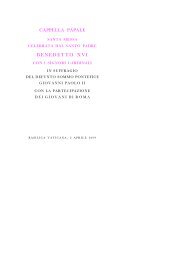
![AAS 01 [1909] - La Santa Sede](https://img.yumpu.com/51456523/1/180x260/aas-01-1909-la-santa-sede.jpg?quality=85)
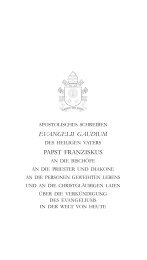
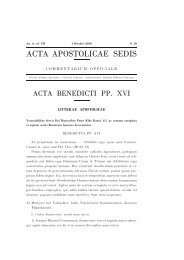
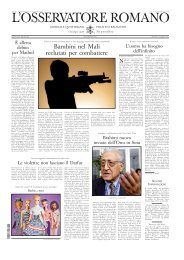
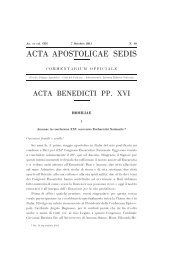
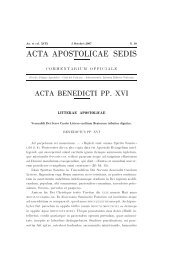
![AAS 20 [1928] - La Santa Sede](https://img.yumpu.com/19772818/1/180x260/aas-20-1928-la-santa-sede.jpg?quality=85)
